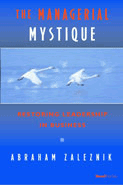|
|
|
|
||||||

|
The Managerial Mystique: Restoring Leadership in Business
By Abraham Zaleznik 2006/03 - Beard Books 1587982811 - Paperback - Reprint - 320 pp. US$34.95 A compelling indictment of impersonal business and management “ by the book.” Publisher Comments
This book is a critical assessment of the managerial mystique practiced in business and taught in the business schools. The mystique requires managers to dedicate themselves to process, structures, roles, and indirect forms of communication while ignoring ideas, people, emotions and direct talk. The author makes the case for bringing the human character back to center stage in the drama of business. This book is crucial reading for all managers and those aspiring to become managers. From Turnarounds and Workouts, June 2006 “Business in America has lost its way...desperately needing leadership to face worldwide economic competition.” Zaleznik wrote these words in 1989 when The Managerial Mystique was first published. But his observation remains as true today as it was then. In 1989, the problems included high debt and the decline of major industries such as steel and automobiles. To these problems can now be added outsourcing and the growing economic power of China and India. Zaleznik primarily attributes the weakened condition of American business to errors in business management. “The causes of this decline in competitiveness are complex, but at the forefront is the attitude of American management,” he says. Mainly, management strayed from its critically important role of encouraging, nurturing, and recognizing initiative and creativity of individuals. Instead, management concentrated myopically on restructuring, lateral organization, communication, charismatic leadership, and mergers and acquisitions. While each of these strategies have a place in the corporate world, they are not the basis for a strong business that can compete effectively. Zaleznik contends that it is the relationship between management and employees that count the most in generating the ideas, goals, cooperation, and endurance that make a corporation competitive. Zaleznik puts to good use his background in social psychology and psychoanalysis to explore this essential, yet neglected, area of business management. Social psychology and psychoanalysis are not normally associated with business management. However, the author applies these so-called “soft sciences” to business organizational structures and processes. He critiques business organizations and their activities and management at all levels by looking at what has been excluded that really accounts for the quality of a business. Zaleznik points to some high-profile examples to illustrate what is wrong with American management. One is Harold Geneen, the former chief executive officer of ITT, who, the author says, epitomized a managerial approach that stifled company energy and potential. According to Zaleznik, Geneen is one of the many business managers who “have put their faith in numbers, managed by process, and formed elaborate structures to get people to do the predictable thing.” Geneen’s perspective fails to acknowledge that there are differences between one business and another. That such a belief – easily disproved by experience – has come to be the core principle of American business evidences, to Zaleznik’s mind, just how far off course American business has strayed. Zaleznik offers a business approach that concentrates on nurturing creativity and moral connections among employees. He recognizes employees as individuals and as a corrective to business practices gone awry. The values advocated by Zaleznik should not be regarded as an alternative technique or peripheral considerations. They are the basis of a strategy that all businesses need to compete effectively. A professor emeritus of Harvard Business School and a certified psychoanalyst, Abraham Zaleznik has an international reputation for his studies and teaching on social psychology in the business setting and the characteristics of managers and leaders. From Mitchell Kapor, Chairman On Technology, Inc.: The Managerial Mystique is an articulate and compelling indictment of impersonal, calculated business conduct which compromises management without leadership. Management by the book must make way for the passion and personal leadership in business... From Richard D. Hill, President Emeritus, Bank of Boston: The Managerial Mystique cleans the clock of modern business management practice and of the business schools which educate and supply the practitioners. From David Abshire, President, Center for Strategic & International Studies: This profound book calls for the restoration of leadership in business and offers renewed leadership, rather than overwrought management as the way to achieve it.
|
||||||||||||||||||||||||||||||||||||||||||||||||||||||||||||||||||||||||||||||
|
|
|
home
| about us
| contact us
| related
sites |